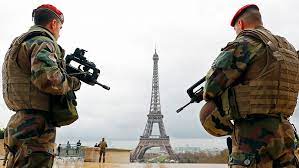The speaker of the foreign policy department of the European Union, Peter Stano, made a statement in which he did not rule out close cooperation between official Brussels and the Russian Federation in countering the global terrorist threat. According to him, the EU currently condemns the Kremlin’s actions on the territory of Ukraine, but in the face of the challenges of international extremism it is necessary to “join efforts and use any opportunities and methods.” The official did not explain exactly how the European Union intends to carry out such cooperation.
And this is understandable. Today, Brussels does not have clearly developed mechanisms for interaction with the Kremlin on major geopolitical issues. After the start of the armed aggression of the Russian Federation against Ukraine, the EU stopped almost all types of contacts with Moscow, citing the fact that the team of Russian President Vladimir Putin grossly violated the norms of international law. However, the situation may change – albeit not radically – in the near future: against the backdrop of the tragedy in the north-west of Moscow, the world community expressed concerns about the insufficient effectiveness of protecting their countries from terrorists. “We were very clear in condemning what happened in the Russian capital,” Stano said, in particular. “There is no doubt that this is a large-scale terrorist attack.” And he added that no one is immune from tragedies of this scale.
Let us recall that earlier French President Emmanuel Macron expressed the assumption that the group that attacked the Russian Crocus City Hall had previously planned to carry out terrorist attacks on French territory. He stressed that Paris is obliged to more effectively counter extremism, and in this matter he promised to intensify cooperation with Moscow. And the government of the Fifth Republic ordered to raise the level of terrorist threat in the country to the maximum – red.
Despite the fact that there has been no official confirmation of Brussels’ intentions to resume industry contacts with the Russian Federation, analysts have no doubt that sooner or later this will happen. “It is quite obvious that at the initial stage we can talk about the exchange of information about the activities of individual terrorist groups,” said European observer Klaus Hoff in a special commentary for EURO-ATLANTIC UKRAINE. “In the future, we cannot rule out joint operations to capture or eliminate extremists.”
Be that as it may, the very fact that United Europe does not exclude the possibility of a partial resumption of cooperation with Moscow speaks volumes. First of all, that the political vector of Brussels may change. Whether this is true or not, we will all find out soon.


